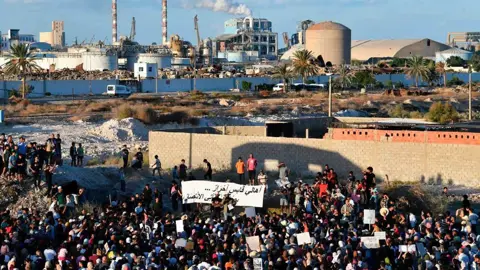Protests Erupt in Gabes Over Health Crisis Linked to Industrial Pollution

Gabes, a city in southeastern Tunisia, is witnessing heightened tensions as residents protest against a series of suffocation and paralysis incidents attributed to the Tunisian Chemical Group.
Hundreds of demonstrators gathered outside the Gabes Court, advocating for a lawsuit aimed at closing polluting industrial facilities. Protesters chanted demands to end what they term an "environmental disaster" and called for the dismantling of a phosphate processing plant accused of causing long-term health issues and environmental degradation.
During a court session intended to discuss the suspension of the group's operations, which was postponed, lawyer Munir Adouni, representing the plaintiffs, presented evidence indicating a "crime against the city." The case is scheduled for further review on November 20.
The protests gained momentum after videos circulated showing students in critical condition due to suffocation incidents within schools. Local authorities reported 22 new suffocation cases at Shatt Al-Salam School and three additional cases at another institution, with symptoms including difficulty walking, numbness, and partial paralysis, which sparked widespread public outrage.
Residents have condemned the group's activities, operational since 1972, as a "persistent environmental crime" linked to rising cancer rates and respiratory issues. Environmental assessments highlight the release of toxic gases and the disposal of phosphogypsum waste, which contains heavy metals, into the sea.
In response to public outcry, the Minister of Environment announced plans to clean 9,000 hectares of Gabes Bay's seabed, while the Minister of Equipment committed to implementing "urgent and exceptional" pollution reduction measures. President Kais Saied has also formed a special team to address the ongoing crisis.
Despite these initiatives, the situation remains complicated due to the phosphate sector's economic significance in Tunisia, where the government aims to boost fertilizer production to 13 million tons annually by 2030, raising concerns about balancing economic interests with residents' rights to a healthy environment.
